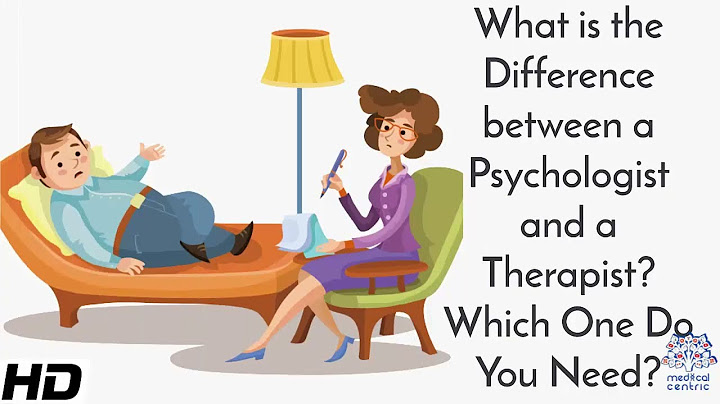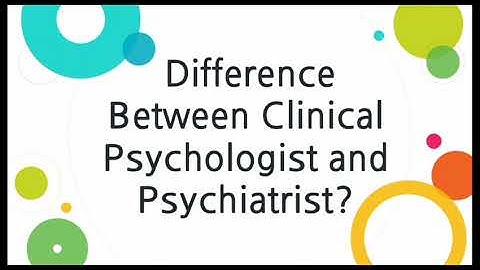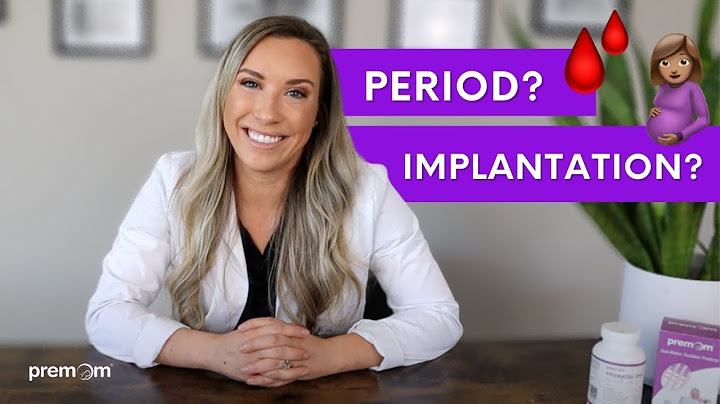Thinking about starting counseling but not sure what type of mental health professional you should see? There are a lot of options, which can make it hard to choose. When you want to get help in your life, the last thing you want is to choose the wrong type of professional and delay your healing journey. Understanding the key differences between a therapist and psychiatrist can help you prevent that mistake. Show This article will detail for you some of the differences and advantages of each, but first, here's the simple answer: The difference between therapist and psychiatrist services is that a psychiatrist looks at the scientific side of mental health and is able to prescribe medication. They are medical doctors that have attended medical school. A therapist is a licensed mental health professional that focuses on the therapeutic side of mental health and mental health disorders. Curious About The Difference Between A Therapist And A Psychiatrist What Type of Care Does a Therapist Provide? A therapist has a wide range of expertise in providing therapy to improve the life and mental wellbeing of their clients. Any licensed practitioner providing mental health care using a therapeutic approach is considered a therapist. Therapists can be social workers, counselors, or clinicians. Therapists are mental health professionals that may specialize in psychotherapy, talk therapy, or use a combination of different approaches and techniques for providing mental health. Therapists are all licensed, but the requirements for the licensing depends on where they are working. Some therapists focus on specific mental disorders, while others specialize in a specific type of therapy, such as child therapy, group therapy, marriage and family therapy, or individual therapy. What Type of Care Does a Psychiatrist Provide? A psychiatrist, vs therapist, is a medical doctor of psychiatry. While both are types of mental health care providers, psychiatrists go to medical school so they can prescribe medications used to treat specific mental disorders as defined in the DSM-5. The DSM-V is a diagnostic and statistical manual of mental disorders that is used for diagnosis. Psychiatrists are medical doctors that use a scientific approach to understanding psychiatric conditions such as depression or schizophrenia and can prescribe medication to help deal with the condition. Psychiatry is a specialized field of medicine and a psychiatrist is not the same as a primary care doctor who practices general medicine. A psychiatrist can diagnose and treat mental disorders and mental health symptoms that may not respond to counseling. Some mental health issues improve with therapy, but they may also require specific medications for the best outcomes as well. A psychiatrist will interview patients, write prescriptions, and prescribe medications to treat mental health disorders based on an accurate diagnosis. Medications are closely monitored and can be adjusted as a client moves through therapy. This is important because biological factors, medical conditions, and other factors may affect how a person responds to certain medications. For example, while lithium is commonly prescribed for people with bipolar disorder, it isn’t always the right fit for everyone. Adjusting a treatment plan may be necessary when weighing the treatment options most suitable for a person’s individual needs. Most often, a psychiatrist will want a client to be in therapy as well as be on medication, as opposed to just using medication as a treatment option. Understanding the Difference Between a Therapist and a Psychiatrist The main difference between a therapist and a psychiatrist is a medical degree in psychiatry. A psychiatrist is licensed to prescribe medications for mental disorders, whereas a therapist does not have that ability. Psychiatrists use the DSM-5 to diagnose patients by studying and researching the symptoms. Once a diagnosis is achieved, the psychiatrist's patients may then seek a therapist to provide talk therapy and help them cope and achieve progress.  Most therapists have a degree and are licensed to practice therapy professionally, but they do not have the same specialized medical degree as psychiatrists. Any licensed mental health care provider that delivers therapy to a patient is considered a therapist, but only a doctor of psychiatry can prescribe medication and therapy. Some therapists and mental health counselors specialize in specific areas of the mental health field or even specific mental health conditions. Psychotherapy, behavior modification, talk therapy, behavioral therapy, family therapy and exposure therapy are just a few of the specialized therapies provided by practicing psychologists and therapists to treat mental health conditions. Most psychiatrists will recommend therapy with a licensed professional after they diagnose and prescribe medication if it is needed to help manage stress or symptoms of a mental health disorder. What About the Difference between a Psychologist and a Psychiatrist? A psychologist has not only a master degree but also a doctoral degree in psychology. (Social workers, counselors, and clinicians typically have master's degrees.) Psychologists provide therapy, but often spend a significant amount of time providing clinical evaluations and testing to their clients as well. Unlike psychiatrists, psychologists are not medical doctors. They may suggest that a client would benefit from taking medications, but they cannot prescribe them. What to Look for When Choosing a Mental Health Provider If you have decided to look into counseling, good for you! This is a big decision for most people, and you should feel good about taking this first step. Here are a few things to consider before starting the process:
Curious About The Difference Between A Therapist And A Psychiatrist What to Expect with Your First Session Many people feel a bit nervous about their first meeting or talk therapy session with a mental health provider. Rest assured that although you may feel uncomfortable talking about personal matters with a "stranger," this person is trained to be an empathetic listener and will not be shocked or judgmental about what you have to say. Your first meeting may be called an "intake meeting," in which you will be asked to provide some basic background information about yourself and your situation. The mental health provider will ask why you are there and what you hope to achieve from therapy. They will talk about what they can offer and what to expect from your meetings together. Some therapists like to assign "homework" asking you to think about a certain topic or take a small action before your next session that you can discuss when you meet again. If you have questions about anything-from what you want to cover in therapy, to the provider's credentials, to the office hours of when your therapist can be reached, don't hesitate to ask. You should feel confident that any concern or question you have is addressed. Hopefully, the mental health provider you meet with makes you feel comfortable and accepted. It's important that you feel that a sense of rapport can develop between the two of you. Be open to this person and willing to share what's on your mind. The more honest you can be in the process, the more your therapist can help you. If after a few sessions you feel that you and your provider are not "clicking," that's okay. After all, this is a personal relationship, and sometimes people just don't connect, through no fault of their own. But don't give up on therapy altogether. Find someone else who may be better suited to you. The right person can help you make the progress you're hoping for. It may take some time, but you're worth the effort.  Consider Online Therapy If you're looking for an individual, couples or family therapist, BetterHelp has online licensed therapists available. They are able to work with you from anywhere you're located. This allows you to connect with professionals you might not have been able to connect with otherwise. You have 24/7 access to communicating with a professional about your mental health challenges. Below are some reviews of BetterHelp counselors, from people experiencing different issues. Counselor Reviews "I have seen multiple counselors and never stuck with them for more than a month. Brian is the first counselor who has ever helped me get past some of my biggest roadblocks. I've never learned as much as I have before while working with him. I truly believe he's helped me make positive changes that I've been needing to make for so long, and I couldn't be more grateful or glad that I've found him on here and have had his help through the most trying time I've encountered thus far." "Erika is a Godsend. She had me look at my situation and grief in a healthier way. She is teaching me coping skills that I will be able to use the rest of my life. I like that I can text her whatever I am thinking and feeling that exact moment. She always responds quickly and is able to address the issues I texted. We also talked on the phone, which makes it all the more personal. I have gotten more out of my two weeks with Erika than I did with two years of conventional therapy with a psychiatrist and a counselor at the same time."
 Conclusion Both psychiatrists and therapists can play an important role in your road to recovery. Understanding the difference helps you know the right one to work with or let you know if you should be working with both. No matter what you're experiencing, with the right tools, you can move forward to a truly fulfilling life. Take the first step today. Some commonly asked questions related to this topic include: Is it better to see a psychiatrist or therapist? Is psychologist and therapist the same thing? Can you see a psychiatrist without seeing a therapist? Can therapists diagnose mental disorders? How do I know if I need therapy? Can my therapist give me a diagnosis? Are psychiatrists therapists? Do therapists diagnose you? What should I not tell a psychiatrist? Should I see a psychiatrist for anxiety? Is it better to see a psychiatrist or therapist?If the issue you're hoping to address is relationship-focused, say a problem at work or with a family member, you may find what you need from a psychologist. If you are experiencing debilitating mental health symptoms that are interfering with your daily life, a psychiatrist may be a good place to start.
Is a psychiatrist a type of therapist?Psychologists, psychiatrists, and therapists aren't one and the same, but they often work together closely to help diagnose and treat mental disorders. Together, these mental health professionals can provide the best possible care for mental health or behavioral issues.
Can therapists diagnose mental illness?On the other hand, therapists, while they can't prescribe medication, are licensed to assess, diagnose, and treat mental health issues — and they're usually much better equipped to diagnose emotional or behavioral disorders than your medical doctor would be since their education and training is focused on mental health ...
|

Advertising
LATEST NEWS
Advertising
Populer
Advertising
About

Copyright © 2024 berikutyang Inc.











